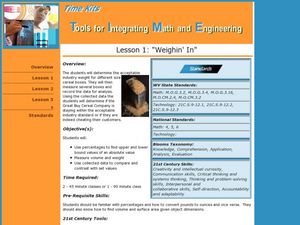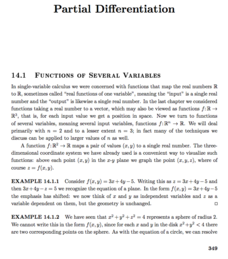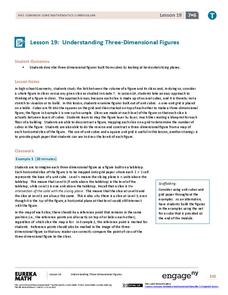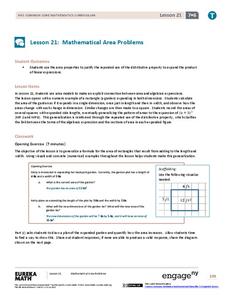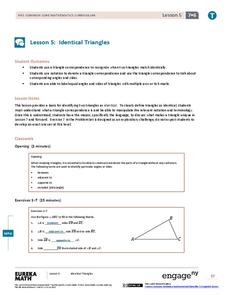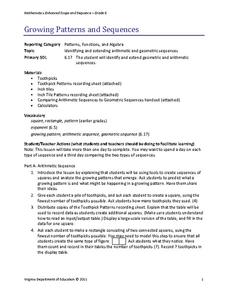College Board
2015 AP® Calculus BC Free-Response Questions
How will the exam ask this question? The free-response questions from the 2015 AP Calculus BC exam demonstrate how questions appear on the test. Using the questions, pupils gain experience answering similar inquiries to what they see on...
Virginia Department of Education
Exploring 3-D Geometry
Take young mathematicians on an exploration of the world of 3-D geometry with this seven-lesson unit. After first defining the terms perimeter, area, and volume and how they apply to the real world, students continue on...
College Board
2013 AP® Calculus AB Free-Response Questions
What is the important stuff? The free-response questions from the 2013 Calculus AB exam highlight the topics in calculus assessed that year. Items provide pupils the opportunity to experience questions similar to what they will see on...
College Board
2009 AP® Calculus BC Free-Response Questions
Dive into the exam review. Pupils use questions, including one about diving into a pool, to prepare for the AP® Calculus BC exam. Items include contextual and non-contextual questions with contextual examples requiring a calculator....
Curated OER
Math Averages
Students perform different activities to better explain that the word "Average" has 5 different meanings.
Curated OER
Tools for Integrating Math and Engineering: Weighin' In
Students collect and analyze data on a fictional cereal company's products. In this measurement lesson, students collect data from cereal boxes (weight, volume, surface area, etc.) to determine if the boxes labels correctly inform...
Whitman College
Calculus - Early Transcendentals
This textbook takes the learner from the basic definition of slope through derivatives, integrals, and vector multivariable calculus. Each section is composed primarily of examples, with theoretical introductions and explanations in...
Curated OER
Decimals Decide Olympic Champions
The class discovers how a decimal can make all the difference in the Olympics. As they learn about decimal place values, they compare and contrast data and demonstrate decimal values using manipulatives.
EngageNY
Newton’s Law of Cooling, Revisited
Does Newton's Law of Cooling have anything to do with apples? Scholars apply Newton's Law of Cooling to solve problems in the 29th installment of a 35-part module. Now that they have knowledge of logarithms, they can determine the decay...
EngageNY
Surface Area II
Examine the surface area of composite figures using an exploratory approach. As a continuation of the previous lesson plan of the 29-part series, young scholars develop plans for finding the surface area of composite figures. Examples...
EngageNY
Understanding Three-Dimensional Figures
You can't judge a book by its cover ... or a cube structure by just one face. A creative instructional activity looks at the shape of several cube structures described by level slices. The 20th instructional activity of the 29-part...
EngageNY
Mathematical Area Problems
Teach the connection between area models and the distributive property through problem-solving. The 22nd activity in a series of 29 explains the distributive property graphically. Learners build area models from word problems and convert...
EngageNY
Slicing a Right Rectangular Pyramid with a Plane
How many ways can you slice a pyramid? The 18th lesson of the 29-part series examines the multiple planes of a rectangular pyramid. Pupils study each slice to determine its shape and relation to the different faces.
EngageNY
Identical Triangles
Explore vocabulary and notation related to triangles and congruence. The fifth lesson in the 29-part series helps pupils build their knowledge of triangle relationships. Individuals identify corresponding parts of identical triangles and...
EngageNY
Collecting Rational Number Like Terms
Teach pupils to handle fractions fluently. The sixth installment in the series of 28 has class members apply the concepts learned in previous lessons to expressions with fractional coefficients. The fractions are both mixed numbers and...
EngageNY
Complementary and Supplementary Angles
Connect algebraic and geometric concepts to solve problems. The first instructional activity in the 29-part series examines complementary and supplementary angle relationships. Scholars write equations to represent the relationships and...
EngageNY
Solving Inequalities
Investigate complex problem situations by applying inequalities. Building from concepts explored in the previous lesson plan, learners read word problems and develop inequalities to represent the situation. They then solve the...
EngageNY
Angle Problems and Solving Equations II
Demonstrate the application of algebra to geometric angle relationships with an activity that asks learners to use what they know about adjacent and vertical angles to write algebraic equations. Diagrams become more complex in this...
EngageNY
Generating Equivalent Expressions II
Discover how to apply the commutative and associative properties to generate equivalent expressions. The second lesson in the 28-part module asks pupils to rearrange an expression by grouping like terms. From there, they can combine...
Virginia Department of Education
Growing Patterns and Sequences
Learners explore, discover, compare, and contrast arithmetic and geometric sequences in this collaborative, hands-on activity. They build and analyze growing patterns to distinguish which kind of sequence is represented by a set of data...
Virginia Department of Education
Adding and Subtracting Fractions
Your learners will enjoy playing a game as a motivator to learning and remembering the adding and subtracting of fractions.
Virginia Department of Education
Practical Problems Involving Decimals
After discussing decimals and "going shopping" in the classroom, young mathematicians are given four practical word problems that require them to estimate their answers, given specific information. The highlight of the lesson is...
Virginia Department of Education
Exponents
Expand your knowledge of exponents with an activity that promotes critical thinking and comparison skills. Middle and high schoolers compare numbers written in expanded and exponential form and explain their strategies for solving...
Charleston School District
Graphs of Linear Functions
What does a slope of 2/3 mean? Develop an understanding of the key features of a linear function. Pupils graph the linear functions and explain the meaning of the slope and intercepts of the graphs.





